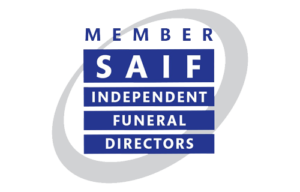Planning a funeral is one of the most meaningful and emotional responsibilities a person can undertake. During a period of grief, it can be difficult to think clearly and make decisions. That’s why having a structured guide is invaluable — it helps you navigate the process with clarity and peace of mind, while honouring the life and memory of your loved one.
As funeral directors, our role is to provide compassionate support, expert guidance, and careful attention to detail through every step. We are to be guided by your wishes. Whether you're planning a funeral in advance or arranging services after someone has died, this guide is designed to help you understand each part of the process.
1. Notify the relevant authorities
The first step when a loved one dies is to ensure the death is legally declared. If the individual dies in a hospital, hospice facility, or nursing home, the staff will usually take care of this and guide you through the immediate next steps.
If the death occurs at home and is unexpected, you should call 999. Paramedics and police may arrive to assess the situation and pronounce the death. In some cases, the coroner or medical examiner may also become involved.
Once the death has been officially verified, the chosen funeral director should be contacted to arrange collection. You can contact us on our immediate assistance out-of-hours phone number 020 7387 6075. We can bring your loved one into our care at any time of day or night.
2. Choose a funeral director
Choosing a funeral director is a deeply personal decision. Some families have long-standing relationships with a local provider, while others may be selecting one for the first time. Either way, look for a funeral director who is:
- Compassionate and professional
- Transparent about pricing and services
- Experienced with your cultural or religious preferences
- Willing to personalise the service to fit your needs
You’ll be working closely with the funeral director, so it’s important to feel comfortable and confident in their care.
3. Meet with the funeral director to begin arrangements
Your first in-person, virtual meeting or phone call with the funeral director will cover a wide range of decisions. The initial meeting usually includes:
- Obtaining key information about the deceased
- Reviewing any pre-planned funeral instructions, if available
- Discussing burial or cremation options
- Discussing options for dates if registration has taken place, and the location for services
- Reviewing the budget and payment options
If your loved one pre-arranged or pre-paid for services, this meeting will also involve reviewing those records and confirming their wishes.
4. Decide between burial and cremation
One of the most significant choices is whether the deceased is buried or cremated. This decision often reflects the values, beliefs, and traditions of the family or the deceased.
Burial typically includes:
- Embalming (if a viewing is planned)
- A coffin
- Purchase of a cemetery plot
- A headstone or grave marker
Cremation will include:
- Embalming (if a viewing is planned)
- A committal of the deceased, either by direct cremation (with or without a memorial service) or cremation after a traditional funeral
- A coffin
- Options for scattering, interring, or keeping the ashes
As funeral directors, we will help you understand the legal requirements, costs, and timelines associated with each option.
5. Select funeral options
Depending on the type of service, you may need to choose various funeral service options. These may include:
- Coffins (wood, metal, eco-friendly)
- Urns (metal, ceramic, biodegradable)
- Outer burial containers, vaults or liners, are sometimes required by cemeteries
- Memorial items (prayer cards, guest books, candles)
A reputable funeral director will provide a price list, which details all available items and services so that you can make informed decisions within your budget. You can view all our prices here or use our estimator tool in your own time and anonymously if you prefer.
6. Plan the service
Funeral and memorial services are deeply personal and can range from traditional religious ceremonies to contemporary celebrations of life. Your funeral director will help you plan a service that reflects the personality, beliefs, and legacy of your loved one.
Common service elements include:
- Clergy or celebrant to officiate
- Recorded musical selections or live performances
- Readings, poems, or scripture
- Eulogies or remembrances
- Slideshows or video tributes
- Military honours (if applicable)
- Cultural or religious rituals
Services can be held at a funeral home, place of worship, private residence, graveside, or any location meaningful to the family.
7. Coordinate with the cemetery - if applicable
If burial is chosen, the next step is coordinating with the cemetery. Tasks may include:
- Purchasing or confirming ownership of a burial plot
- Understanding cemetery rules and regulations (e.g., grave markers, flowers)
We often work closely with cemeteries and can assist with communication, scheduling, and documentation.
8. Arrange an online death notice or obituary – if applicable
An obituary is more than a death notice — it’s a story that honours the life of the deceased. It typically includes:
- Full name, age, and hometown
- Date and place of birth and death
- Names of surviving family members
- Brief life story, career, hobbies, or accomplishments
- Funeral or memorial service details
- Information about memorial contributions
Funeral directors can help to arrange notices and obituaries in local newspapers and online platforms. You may also choose to create a memorial website for guests to leave condolences and share memories.
You can view our tributes and donations page here.
9. Organise a reception
Many families choose to host a reception or wake after the service to continue sharing memories, food, and fellowship. Consider:
- Location (church hall, funeral director reception area, family home, or restaurant)
- Catering
- Décor, memory tables, or photo displays
- A guestbook or memory journal
This gathering provides a comforting, communal space for support and storytelling.
10. Handle administrative details
In the days and weeks following the funeral, there are practical matters that need attention. You will need to provide certified copies of the death certificate, which are required for:
- Closing bank accounts
- Accessing life insurance or benefits
- Handling estate and legal matters
- Transferring property or assets
Depending on the circumstances, the list of people and organisations you need to notify will differ.
11. Seek bereavement support
Grief doesn’t end with the funeral. Many people find it helpful to seek support in the weeks, months and years that follow. Funeral directors may offer:
- Grief counselling or referrals
- Support groups
- Memorial events or remembrance services
- Resources for children or teens coping with loss
You can find a full list of helpful support and organisations here
We provide all our clients with 6 free sessions of bereavement counselling through our independent provider, should you want it.
Taking care of emotional well-being is a vital part of the healing journey. Encourage family members to be gentle with themselves and seek help when needed.
Final thoughts
Every life is unique, and every farewell should reflect that. Planning a funeral may feel daunting, but with the right guidance and support, it can become a beautiful, healing experience. As funeral directors, our purpose is to ease the burden and help families create a tribute that honours a life with dignity, love, and respect.
Whether you're planning ahead or navigating a recent loss, we’re here to walk beside you — step by step. If you have any questions or need to organise a funeral, do not hesitate to get in touch with us with no obligation. We are here to help however we can.
You can contact us at any of our 5 branches or by e-mail: info@levertons.co.uk. Our office hours are 9am to 5pm, but for immediate assistance out of hours, call 020 7387 6075.







